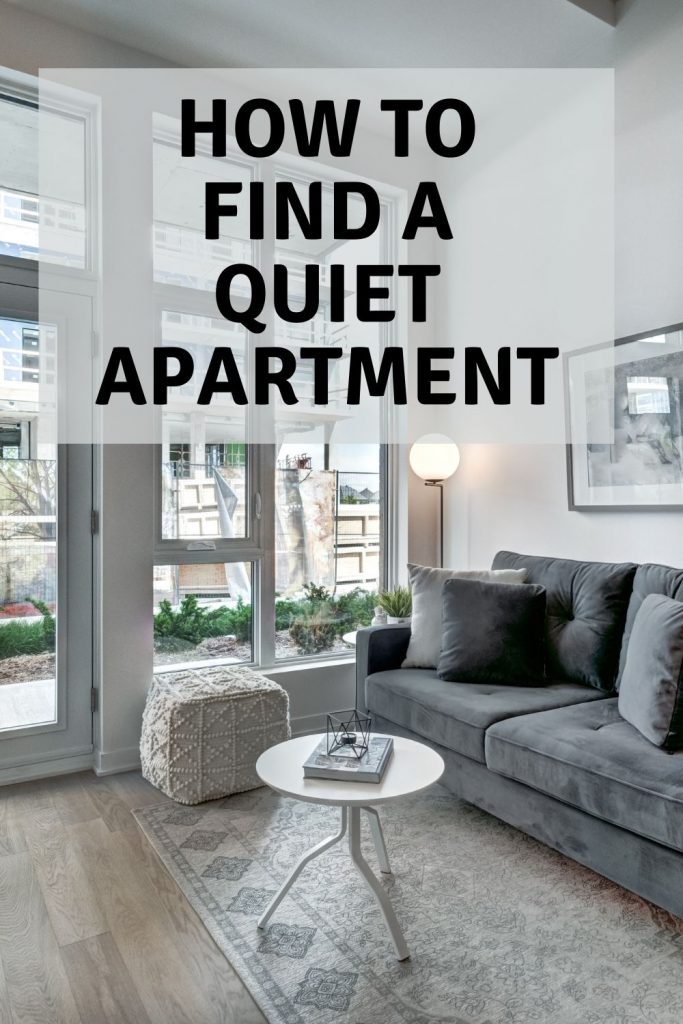What is the most important thing when deciding where to live? Not every person agrees on this question. Some say safety, others say affordability, and still more might say distance from work or family.
What if I were to tell you that there’s a quality that trumps all of these? That would be peace and quiet.
Without it, no amount of other conditions will make your life remotely enjoyable or fulfilling.
And in today’s world with so many distractions vying for our attention, finding a place that provides some measure of solitude can feel like an impossible task.
There are plenty of ways to find an apartment with less noise pollution than the average home in America has today. So read on as we explore how you can find the perfect apartment for you.

Finding a quiet apartment
Finding a quiet apartment can be difficult, but there are some things you can do to make it easier.
- You should start by looking for apartments that don’t have any exterior noise such as highways or streets near the building. This will eliminate a lot of potential disturbances.
- Next, look at how many neighbors you will have and what they’re doing. If they are smokers or pets, this could cause problems in your apartment so try to find one with fewer people or animals if possible.
- Also consider the size of your new home! It’s much more difficult to find peace and quiet in an open-concept floor plan than it is in a closed off space like townhouse or condo unit.
- Think about all of the sounds inside your new place. Will you be close to a noisy appliance? The loud sounds of an air conditioner or washing machine from another apartment can be quite disruptive. Remember that the average person is exposed to 80 hours of noise per week.
- Look at the age of the building. Older buildings tend to be more substantial being built from much more brick which will insulate sound more effectively. Newer buildings are often made from timber based products which afford less sound insulation.
- Take the time to explore the neighborhood to see what it is like and try to visit at different times of the day. An untidy, dirty neighborhood can provide you with an indication as to the types of people that live there and perhaps their behavior.
- Think about what kind of neighbors you want. If you can’t afford a place with just the right kind, there are other factors to consider like age and profession. Young children create more noise than adults or teenagers so if you’re sensitive to that sort of thing, try to find a new home away from young families.
- Remember that whatever you choose will be your home and you will want some peace and quiet, so now is not the time to be fearful of making informed judgements about the type of people that live in the neighborhood. Better to be objective beforehand rather than regretting your decision later because you were too nice.
[amazon box=”B09B4TNVSJ” template=”horizontal” title=”Silent Mini Fridge” description=”Silent operation. 5 adjustable temperature settings. Holds 120 cans. Ideal option for apartment dwellers “]
Choosing the right location with less noise
The best way to find a quiet apartment will be by placing yourself in an area that is already known for lower amounts of noise.
There are many things you can do to foster this type of neighborhood.
For example: If you’re looking to move into an apartment, buying a unit that faces the back of the building will be quieter than a unit facing the street.
Check the reviews of the apartments and the area
When looking at a new apartment, take a moment to think about why you’re going there and where you intend to live.
It’s all well and good to read reviews but if they don’t reflect what your needs are then it might not be as useful.
Think about what you can tolerate in a new apartment and make some careful decisions.
Make sure that you do some research
If you want a quiet area when you get home, then search for an apartment in a neighborhood with older buildings that aren’t as modern.
It’s also useful to look at the demographic of the area and see what it tells you about the kinds of people that live there.
Visit around lunchtime and dinner time to see how busy it is.
Do the people hang around outside? What do they look like dressed and what is their behavior like?
Try to find a place that has less traffic in its neighborhood.
People walking, driving or sitting at bus stops will all contribute to noise pollution and you don’t want to live with it.
What type of businesses are in the area?
You may like the idea of an apartment in an area where there are lots of bars or restaurants and other sources of entertainment, and these can all be attractions.
However, they can also all be sources of noise pollution which may affect your enjoyment of your home.
Think carefully about the types of businesses that are near your proposed new home and the types of activities that they do.
For example an apartment near a firehouse or police station will be much noisier 24/7 than one which is near offices or banks.
A little research could help prevent you from making a major mistake.
Speak to the existing tenants
If you are able to then try to speak with people that already live in the apartment complex.
You may need to be a little wily here. Don’t ask the people in the apartment that you’re considering ( if they are still there ) as, if it is noisy then they may say otherwise – just to get out of there!
Also be wary about asking the landlord, there are some that will say anything just to get you to rent from them and to get the apartment filled.
Don’t be afraid to walk away
If, after you have done your homework, you are still uncertain, then it is best to listen to your gut instinct and walk away.
It may seem frustrating but in most areas there are plenty of options and taking time to make the right choice will be of benefit in the longer term.
Final Words
It can be difficult to find a place that is truly quiet.
From the noise of traffic, sirens and loud neighbors to noisy appliances like your dishwasher or refrigerator, it’s hard to escape sound pollution in today’s world.
Taking some simple steps before you commit to an apartment will help you to find a place that provides you with the levels of peace and quiet that you need.
Read Next
- Will coyotes attack you in a tent?
- Will a CB antenna work for a ham radio?

- Will a bear attack you in a tent?
- Why you should have night vision goggles for camping
- Why we should all take a break from our phones and laptops

- Why silence is the best revenge





